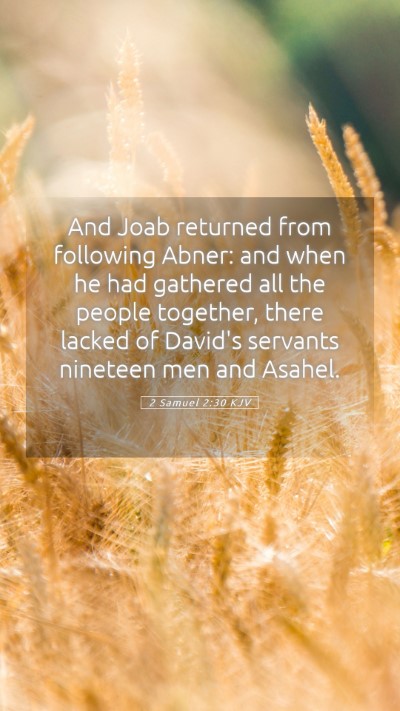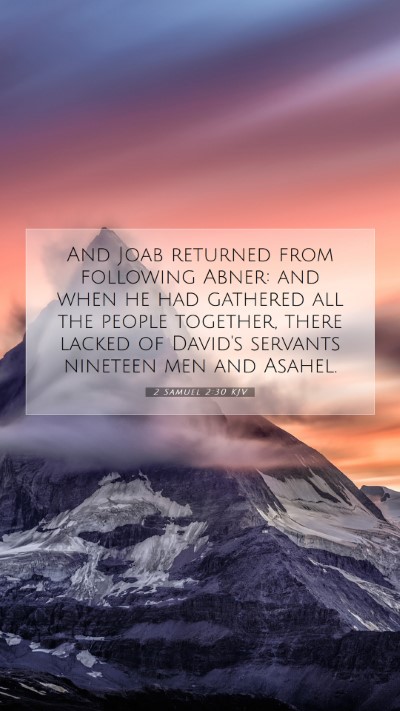Understanding 2 Samuel 2:30
In this scripture, we meet a poignant moment that showcases the consequences of human actions, the gravity of conflict, and the intricate relationships between individuals and their communities. This verse is a vital part of the narrative that can serve as a launching point for deeper Bible verse meanings and Bible verse interpretations.
Text of the Verse
“And David said to Joab and to all the people that were with him, Rend your clothes, and gird you with sackcloth, and mourn before Abner. And king David himself followed the bier.” (2 Samuel 2:30, KJV)
Contextual Background
This verse occurs after the assassination of Abner, a significant military leader and ally of Saul's house. The event is part of a broader narrative concerning the fragmentation of Israel's unity. David, having just started to consolidate his kingship in Judah, faces the complexities and sorrows of leadership amidst civil conflict.
Historical Context
To fully grasp the meaning of Bible verses like 2 Samuel 2:30, understanding the historical context is crucial. Abner had previously led Ishbosheth, Saul's son, against David, yet he later recognizes David's legitimacy and authority. His murder poses a tragic setback for David and symbolizes the turmoil within the nation.
Commentary Insights
Based on insights combined from various commentaries, we can draw rich implications from this verse:
- Matthew Henry: He emphasizes the depth of David's grief not only for Abner but for the state of his nation. David's actions reflect a leader's capacity for lamentation, marking a pivotal shift in taking responsibility over the fate of Israel.
- Albert Barnes: Barnes notes that the public mourning conducted by David serves to unify the people and demonstrate his character as a benevolent king, contrasting with the treachery surrounding Abner's death.
- Adam Clarke: Clarke articulates David's mourning as a symbolic act of acknowledgment of Abner’s contributions despite their past conflicts. This act establishes David’s intention to unify the nation, as he seeks to honor even those who opposed him.
Lessons and Applications
This verse provides profound Bible study insights that can be cultivated into modern applications:
- Humility in Leadership: David's response illustrates how leaders should express compassion and acknowledge loss, a requisite for effective leadership.
- Reconciliation: The act of mourning over Abner suggests a pursuit of reconciliation even with former adversaries, which builds community.
- Grief as a Collective Experience: Engaging in shared mourning solidifies community bonds and facilitates healing, echoing in today’s congregational practices.
Cross References
This verse correlates with other biblical texts that discuss themes of mourning, leadership, and reconciliation:
- 1 Samuel 31:13: The mourning for Saul and Jonathan reflects similar themes of national mourning and leadership.
- 2 Samuel 3:35: David’s further expressions of grief encapsulate the emotion surrounding loss of key figures.
- Matthew 5:4: “Blessed are they that mourn: for they shall be comforted” – aligning Jesus' teachings with themes of grief.
Conclusion
The Bible verse commentary on 2 Samuel 2:30 illuminates the path of understanding profoundly significant moments that reflect the essence of human experience. Engaging with such passages through Bible study groups or online Bible study platforms can foster a richer appreciation of Scripture.
For anyone searching for purposeful ways to apply these insights to daily life, consider how expressions of grief and reconciliation can be replicated in personal and community relationships. The overarching themes urge us toward compassion and unity, transcending the historical narrative into our present moment.


